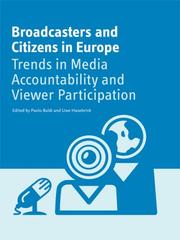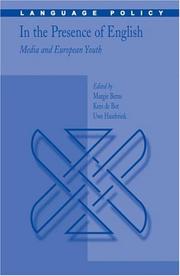| Listing 1 - 10 of 13 | << page >> |
Sort by
|
Book
ISBN: 3789021245 Year: 1990 Publisher: Baden-Baden Nomos
Abstract | Keywords | Export | Availability | Bookmark
 Loading...
Loading...Choose an application
- Reference Manager
- EndNote
- RefWorks (Direct export to RefWorks)
Book
Year: 1986 Publisher: [S.l.]: [chez l'auteur],
Abstract | Keywords | Export | Availability | Bookmark
 Loading...
Loading...Choose an application
- Reference Manager
- EndNote
- RefWorks (Direct export to RefWorks)
Book
ISBN: 3872960784 Year: 1993 Publisher: Baden-Baden Nomos
Abstract | Keywords | Export | Availability | Bookmark
 Loading...
Loading...Choose an application
- Reference Manager
- EndNote
- RefWorks (Direct export to RefWorks)
654.197 --- #eLINK --- Facsimile and television broadcasting --- 654.197 Facsimile and television broadcasting

ISBN: 9781841501604 1841501603 9781841509631 1841509639 1280747706 9781280747700 1841501603 9786610747702 Year: 2007 Publisher: Bristol Intellect
Abstract | Keywords | Export | Availability | Bookmark
 Loading...
Loading...Choose an application
- Reference Manager
- EndNote
- RefWorks (Direct export to RefWorks)
Broadcasting is arguably the most influential and powerful industry operating today. The media impose an inescapable presence in contemporary life and infuse all areas of public communication. But what is the quality of the relationship between 'broadcaster' and 'citizen'? Do the media and media authorities take the audience's interests seriously into account? Do audiences have real opportunities to express themselves? Are citizens well informed and educated about the social, the cultural and the civic role that media can play? In this book, five authors present the main results of an extensiv
Television broadcasting policy --- Television broadcasting --- Television --- Television viewers --- Citizenship --- Influence. --- Social aspects --- Law and legislation
Book
ISBN: 3810011533 Year: 1994 Publisher: Opladen Leske & Budrich
Abstract | Keywords | Export | Availability | Bookmark
 Loading...
Loading...Choose an application
- Reference Manager
- EndNote
- RefWorks (Direct export to RefWorks)
Politics --- Mass communications --- Germany
Book
Abstract | Keywords | Export | Availability | Bookmark
 Loading...
Loading...Choose an application
- Reference Manager
- EndNote
- RefWorks (Direct export to RefWorks)
Digital
ISBN: 9780387368948 Year: 2007 Publisher: Boston, MA Springer Science+Business Media, LLC
Abstract | Keywords | Export | Availability | Bookmark
 Loading...
Loading...Choose an application
- Reference Manager
- EndNote
- RefWorks (Direct export to RefWorks)
Didactics of languages --- Sociolinguistics --- talenonderwijs --- sociolinguïstiek
Book
ISBN: 3789031607 Year: 1993 Publisher: Hamburg Hans-Bredow-Institut
Abstract | Keywords | Export | Availability | Bookmark
 Loading...
Loading...Choose an application
- Reference Manager
- EndNote
- RefWorks (Direct export to RefWorks)

ISBN: 0387368930 9780387368931 1441942335 9786610803606 1280803606 0387368949 Year: 2007 Publisher: New York : Springer,
Abstract | Keywords | Export | Availability | Bookmark
 Loading...
Loading...Choose an application
- Reference Manager
- EndNote
- RefWorks (Direct export to RefWorks)
The starting point for this comparative study on the role of English within the media worlds of European youth is the recognition of the increasing importance of communication with peoples from other cultures and countries. Within the European Union (EU), English has a special role in this regard. While EU policy promotes all languages spoken in member states, and although English is not the most frequently spoken first language, it is the language two Europeans are most likely to use to make themselves understood. This lingua franca phenomenon occurs not only in the fields of science and technology, but also in business and everyday, personal interactions. The media, which plays an important role in intercultural communication, serves as a cultural forum, and both creates culture and transmits representations of other cultures. Its offerings are often highly internationalized, especially in pop culture, films, TV series, and variety shows, which exercise great influence on cultural and linguistic issues in the multilingual, multicultural EU. The primary goals of "In the Presence of English: Media and European Youth" are to gain insight into the roles of English in and for Europe; to contribute to discussions of the possibilities of transnational media offerings; to better understand the influence of media in foreign language acquisition and of its role in promoting cross cultural understanding across European cultures; and to better understand the role of English media in the construction of the world view of European youth. The research presented on the relationship of media use to language proficiency has relevance to how schools react to and take advantage of media influences on English acquisition. It also has implications for approaches to language policy and planning issues relating to the present and future role of English in the EU, and the re-evaluation of the presence and prevalence of English in the media both as a threat to the notion of a European identity and as a contributing factor in the creation of such an identity. Researchers, scholars, practitioners, and students of such fields as second language pedagogy and acquisition, language policy, media and communication, and sociolinguistics as well as educational and social psychology will all have an interest in "In the Presence of English: Media and European Youth".
Communication, International --- English language --- Language policy --- Mass media and education --- Education and mass media --- Education --- Germanic languages --- Influence of English on foreign languages --- International communication --- World communication --- Communication --- Globalization --- Influence on foreign languages --- Languages in contact --- Influence on foreign languages. --- Study and teaching --- Foreign speakers. --- Language and languages. --- Sociolinguistics. --- Media Research. --- Language Education. --- Language and languages --- Language and society --- Society and language --- Sociology of language --- Language and culture --- Linguistics --- Sociology --- Integrational linguistics (Oxford school) --- Foreign languages --- Languages --- Anthropology --- Ethnology --- Information theory --- Meaning (Psychology) --- Philology --- Social aspects --- Sociological aspects --- Communication. --- Sociology. --- Language and education. --- Educational linguistics --- Social theory --- Social sciences --- Communication, Primitive --- Mass communication --- Communication policy --- Language planning
Book
ISBN: 3319655841 3319655833 9783319655840 Year: 2018 Publisher: Springer Nature
Abstract | Keywords | Export | Availability | Bookmark
 Loading...
Loading...Choose an application
- Reference Manager
- EndNote
- RefWorks (Direct export to RefWorks)
This open access volume is about how to research the influence of our changing media environment. Today, there is not one single medium that is the driving force of change. With the spreading of various technical communication media such as mobile phone and internet platforms, we are confronted with a media manifold of deep mediatization. But how can we investigate its transformative capability? This book answers this question by taking a non-media-centric perspective, researching the various figurations of collectivities and organizations humans are involved in. The first part of the book outlines a fundamental understanding of the changing media environment of deep mediatization and its transformative capacity. The second part focuses on collectivities and movements: communities in the city, critical social movements, maker, online gaming groups and networked groups of young people. The third part moves institutions and organizations into the foreground, discussing the transformation of journalism, religion, politics, and education, whilst the fourth and final part is dedicated to methodologies and perspectives.
Culture --- Ethnology. --- Communication. --- Political communication. --- Public policy. --- Social structure. --- Social inequality. --- Cultural and Media Studies. --- Media and Communication. --- Cultural Anthropology. --- Cultural Theory. --- Social Structure, Social Inequality. --- Political Communication. --- Public Policy. --- Study and teaching. --- Egalitarianism --- Inequality --- Social equality --- Social inequality --- Organization, Social --- Social organization --- Political communication --- Communication, Primitive --- Mass communication --- Cultural anthropology --- Ethnography --- Races of man --- Social anthropology --- Cultural studies --- Political science --- Sociology --- Democracy --- Liberty --- Anthropology --- Social institutions --- Human beings --- Political planning. --- Planning in politics --- Public policy --- Planning --- Policy sciences --- Politics, Practical --- Public administration --- Culture-Study and teaching. --- Culture—Study and teaching. --- Media and Communication --- Cultural Anthropology --- Cultural Theory --- Social Structure, Social Inequality --- Political Communication --- Public Policy --- Sociocultural Anthropology --- Social Structure --- media communication --- culture and society --- media transformations --- technical communication media --- social relations and roles --- social fields and institutional dynamics --- identities and collectives --- public debate --- political decision-making --- media logic --- Mediatization --- open access --- Media studies --- Social & cultural anthropology --- Social & ethical issues --- Political science & theory --- Equality. --- Communication in politics.
| Listing 1 - 10 of 13 | << page >> |
Sort by
|

 Search
Search Feedback
Feedback About UniCat
About UniCat  Help
Help News
News